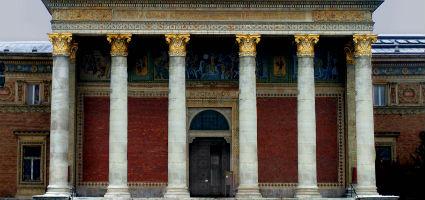 |
Address: 1146, Budapest Dózsa György út 37.
Phone number: (1) 460-7000, (1) 363-2671
E-mail: info@mucsarnok.hu
Opening hours: Tue-Wed 10-18, Thu 12-20, Fri-Sun 10-18
|
|
Ticket for adults
|
1200 HUF
|
|
|
Ticket for adults
(valid for the Kunsthalle and the Ernst Museum)
|
1400 HUF
|
|
|
Group ticket for adults
(from over 10 people)
|
800 HUF
|
/ capita
|
|
Ticket for students
(EU citizens from the age of 6 to 26 )
|
600 HUF
|
|
|
Ticket for students
(valid for the Kunsthalle and the Ernst Museum, 6-26 years of age)
|
700 HUF
|
|
|
Group ticket for students
(from over 10 people)
|
400 HUF
|
/ capita
|
|
Ticket for pensioners
(valid for the Kunsthalle and the Ernst Museum, 62-70 years of age)
|
700 HUF
|
|
|
Ticket for pensioners
(EU citizens from the age of 62 to 70)
|
600 HUF
|
|
|
Ticket for families
(1 adults + 2 children)
|
1800 HUF
|
/ family
|
|
Ticket for families
(2 adults + 2 children)
|
2400 HUF
|
/ family
|
Bazil Duliskovich's recent projection display at the Deep Hall developed from topic selection and his interest in new techniques which, this time, overshadowed the artists most representative creativity in painting and drawing. The exhibition Plan B < / em > summarizes Bazil Duliskovich's work of the last half a year by five video installations of very different in character first the experimental.
Duliskovich playfulness, his search for the right path can be tracked well in the plastics series for the sake which he moves from panel painting from time to time or expands its borders with glass paintings, books and box works and pays meticulous attention for their installation. The exhibition's gesture is the last one, but in any case is is a unique opportunity to change the scope of interpretation of the works of art.
Instruments of illusion, such as the trompe - l'oeil procedures have not played a particular role in Duliskovich's art. However, in the case of video installation deep control is needed for attention directed at the receiving positions, material composed for fixed points of view virtual - visual material will be responsible for the trickery mechanism.
Video installations unfolding in the dark, roam around the notion of prosperity treated as metaphysical mystery with enigmatic layered. The frequently visited location in Kisújbánya or beloved figures of social life but, even his alter ego training is lifted in Duliskovich's works so that they swing over to the horizon of commonness.
The only painting at the exhibition, the Allegory of Painting and the figures of Art Lover < / em >locked melt away from profane contents. With their faceless nudity, in abstract or anachronistic environment balancing on the verge of physical and ethereal beauty, vulnerability and self-revelation. In both cases, the phenomenon of art - an elusive , transcendent phenomenon - motivate and color female nudity. In terms of the perception of nudes, art history is canonical and even its contemporary pre-images may also influence the recipient. So the title of the painting refer s to Johannes Vermeers work of the same title while the video installation is a kind of enigmatic Escher-like interaction, a reminder of a mirror through linking the nudes in different temporal situation. Photos he recorded in the studio enter into dialogue with different nude fragments from the the history of art.
Bazil Duliskovich was born in Nagyszõlõs, in Transcarpathia in 1969. After graduating from Uzhhorod Fine and Applied Arts School and after study trips to Riga , he studied at the Hungarian University of Fine Arts, and participated in the university's post-graduate training. He lives and works in Budapest since 1991. His works have been in numerous solo and group exhibitions , including Rome, Vienna, Berlin, Stuttgart , Paris and Moscow.